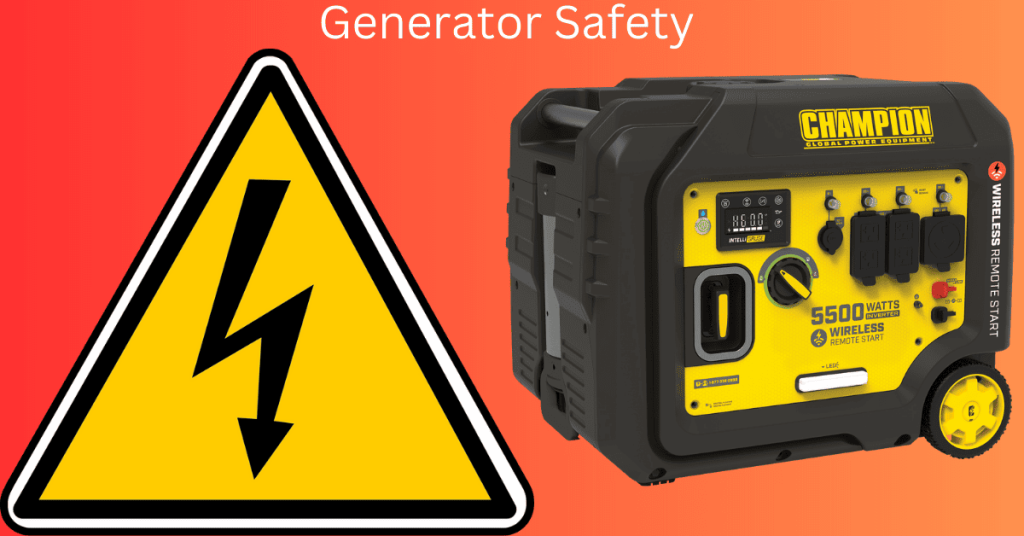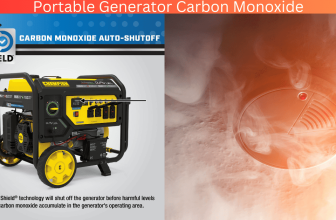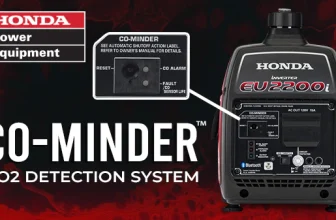As the saying goes, ‘with great power comes great responsibility.’
This couldn’t be more true when it comes to using generators. Whether you’re using one for camping, outdoor events, or as a backup power source during an outage, it’s crucial to understand the potential dangers and how to use them safely.
At first glance, generators may seem fairly simple to use. But the truth is, improper usage can lead to serious injury, property damage, and even death. That’s why it’s important to be generator savvy and have key insights into electrical safety.
With the right knowledge and precautions, you can confidently use a generator for your power needs without putting yourself or others at risk. So, let’s dive in and explore the different types of generators, proper maintenance, safe placement, handling and operating techniques, safety equipment, and emergency preparedness.
Key Takeaways
- Generators can be dangerous and cause injury, property damage, and death if not used properly.
- Carbon monoxide poisoning and electrical shock are the biggest dangers associated with generators.
- Safe generator placement, proper ventilation, and the use of protective equipment are essential for safe generator operation.
- Emergency preparedness, regular maintenance, and choosing the right generator for your needs are crucial for ensuring safe and effective generator use.

The Dangers of Improper Generator Usage
Don’t risk your safety by improperly using a generator – learn about the dangers now! It’s important to recognize that generators can be extremely dangerous if not used properly.
One of the biggest dangers associated with generators is carbon monoxide poisoning. This odorless gas is produced by the generator’s engine and can quickly accumulate in enclosed spaces. Inhaling carbon monoxide can lead to symptoms ranging from headaches and dizziness to unconsciousness and even death.
Another danger associated with generators is electrical shock. It’s important to always keep generators dry and away from water sources to prevent electrocution. Additionally, never attempt to plug a generator into a wall outlet or use it to power your home’s wiring. Doing so can cause backfeeding, which can result in serious injury or even death for yourself or utility workers trying to restore power in the area.
Understanding the different types of generators is crucial for ensuring your safety when using one. Portable generators are great for powering small appliances or tools, but should never be used indoors or in enclosed spaces. Standby generators, on the other hand, are designed to power your home during an outage and require professional installation.
By understanding the different types and proper usage of generators, you can enjoy the benefits of backup power without putting yourself or others in harm’s way.
Understanding the Different Types of Generators
You may not realize the importance of knowing about the different types of generators available in the market. However, understanding the differences between them can help you choose the right one for your needs and ensure your safety.
There are two main types of generators: portable and standby. Portable generators are designed to be moved around and are usually powered by gasoline or propane. They are ideal for powering small appliances, tools, or charging electronic devices during a power outage.
Standby generators, on the other hand, are permanently installed and connected to your home’s electrical system. They are usually powered by natural gas or propane and can provide backup power for your entire house during a blackout.
By knowing the differences between these two types of generators, you can make an informed decision when purchasing one. It’s important to choose the right generator for your needs to avoid overloading or underloading it, which can cause damage and pose a safety hazard.
Now that you have a basic understanding of the different types of generators, it’s time to delve deeper into the world of generator safety and learn about proper maintenance to keep your generator running smoothly and safely.
Proper Generator Maintenance
Maintaining your generator regularly ensures its longevity and reliable performance when you need it most. Here are a few tips we’ve learned through trial and error:
- Check the oil level and air filter before each use. Dirty filters can cause your generator to overheat and shut down, while low oil levels can cause permanent damage to the engine.
- Keep your generator clean and free from debris. A build-up of dirt and debris can clog the engine and cause it to stall.
- Store your generator in a dry, cool place. Moisture can cause rust and damage to the electrical components, so it’s important to keep it in a dry environment.
- Run your generator at least once a month. This will help keep the engine lubricated and prevent it from seizing up.
- Use only clean, fresh gasoline. Stale gasoline can cause the carburetor to clog, which can affect the generator’s performance.
Taking the time to maintain your generator can save you from costly repairs and downtime when you need it most.
In the next section, we’ll cover safe generator placement to ensure your generator is not only working properly, but also not posing a risk to yourself or others.
Remember, a little bit of maintenance goes a long way when it comes to your generator. Don’t wait until the last minute to take care of it. By following these simple tips, you’ll have a reliable source of power for years to come.
Safe Generator Placement
To ensure the safety of those around you, it’s important to consider where you place your generator.
The first step in safe generator placement is to find a dry, level area away from flammable materials. This will reduce the risk of fire and electrocution. Additionally, the generator should be placed in a well-ventilated area to prevent carbon monoxide poisoning.
When choosing a location for your generator, it’s important to consider the noise level. Generators can be quite loud, so it’s best to place them away from living areas and windows. This will help reduce noise pollution and prevent disturbances to your neighbors.
In order to safely handle and operate a generator, it’s essential to follow proper safety guidelines. This includes avoiding contact with electrical wires, ensuring the generator is properly grounded, and never overloading the generator.
By taking these precautions, you can enjoy the benefits of a generator while keeping yourself and those around you safe.
Handling and Operating a Generator Safely
When handling and operating a genny, make sure you’ve got on some proper gear to avoid any accidents, like getting a shock from the wires. It’s important to wear rubber-soled shoes, gloves, and protective eyewear to reduce the risk of electric shock and other injuries. You should also make sure that your hands are dry and that the generator is turned off before touching any of its parts.
Another key aspect of safely operating a generator is proper ventilation. Generators produce carbon monoxide, which is a toxic gas that can be deadly in high concentrations. To prevent carbon monoxide poisoning, always use your generator in a well-ventilated area, and never operate it indoors or in a garage. You should also install carbon monoxide detectors in your home to alert you to any dangerous levels of the gas.
In addition to these precautions, it’s important to follow the manufacturer’s instructions when operating your generator. This includes using the correct fuel and oil, as well as starting and stopping the generator properly. By taking these steps, you can help ensure that your generator operates safely and effectively. And if you do encounter any problems or have any questions, be sure to consult the owner’s manual or contact a qualified electrician for assistance.
When it comes to generator operation, safety should always be your top priority. To further enhance your generator safety, it’s important to have the right equipment on hand. This includes items like grounding rods and cords, circuit breakers, and surge protectors. By using these tools, you can help prevent electrical overload and other dangerous situations.
In the next section, we’ll explore the various types of generator safety equipment and how they can help keep you and your home safe.
Generator Safety Equipment
Protect yourself and your home with the right equipment: grounding rods, cords, circuit breakers, and surge protectors are all essential for safe generator operation. Grounding rods, for instance, are designed to divert excess electrical current safely into the ground, preventing electrical shock to anyone who comes into contact with the generator. Without properly grounding your generator, you run the risk of electrical shock or electrocution, which is why it is crucial to have a grounding rod in place.
Another important piece of equipment is a circuit breaker. Circuit breakers automatically turn off the flow of electricity when they detect a surge or overload, preventing damage to your generator and protecting your home from electrical fires. Similarly, surge protectors protect your generator and connected appliances from power surges that can fry circuitry and cause permanent damage. Using the right cords, such as those made of heavy-duty materials and equipped with safety features, is equally important for safe generator operation.
To emphasize the importance of safety equipment, consider the following table:
| Equipment | Purpose |
|---|---|
| Grounding rod | Diverts excess electrical current safely into the ground, preventing electrical shock |
| Circuit breaker | Automatically turns off the flow of electricity when it detects a surge or overload, preventing damage to your generator and protecting your home from electrical fires |
| Surge protector | Protects your generator and connected appliances from power surges that can fry circuitry and cause permanent damage |
| Heavy-duty cords | Equipped with safety features to prevent electrocution and other electrical hazards |
By investing in the proper safety equipment for your generator, you will not only protect yourself and your home, but also ensure the longevity and reliability of your generator. Don’t skimp on safety when handling electrical equipment – it’s always better to be safe than sorry.
In addition to having the right equipment, it’s important to have a plan for emergency situations. In the next section, we will discuss the steps you can take to prepare for power outages and other emergencies.
Emergency Preparedness
Be ready for anything with a solid plan in place for unexpected power outages and emergencies. When it comes to emergency preparedness, having a generator can be a lifesaver. However, it’s important to have a plan in place before disaster strikes. Here are some key steps to take:
- Know the risks: Take time to research the types of emergencies that are most likely to occur in your area, whether it’s severe weather, earthquakes, or power outages. This will help you understand what kind of generator you need and how to use it safely.
- Have a backup plan: Even the best generator can fail, so it’s important to have a backup plan in place. Make sure you have extra fuel on hand, along with a backup generator or alternative power source.
- Practice safety: Generators can be dangerous if not used properly. Make sure you read the owner’s manual and follow all safety instructions. Keep the generator outside and away from windows and doors to prevent carbon monoxide poisoning.
By taking these steps, you can be confident that you’re prepared for any emergency that comes your way. With a little planning and preparation, you can use your generator safely and confidently, knowing that you’re ready for anything.
Frequently Asked Questions
What are the legal requirements for owning and operating a generator?
To own and operate a generator, we must comply with local, state, and federal regulations. These include obtaining permits, following noise and emissions standards, and ensuring proper installation and maintenance.
How can I determine what size generator I need for my home or business?
Let’s figure out what size generator we need for our home or business. Calculate the total wattage of all the appliances we want to run during an outage. Then, add an additional 25% for safety margin.
Are there any environmental concerns associated with generator usage?
Yes, there are environmental concerns with generator usage. Carbon monoxide emissions can harm air quality and noise pollution can disrupt wildlife. We must be mindful of these impacts and take steps to mitigate them.
Can generators be used indoors or in enclosed spaces?
No, generators should never be used indoors or in enclosed spaces due to the risk of carbon monoxide poisoning. Always use in a well-ventilated area and follow manufacturer instructions for safe use.
What are the most common causes of generator-related accidents and how can they be prevented?
The most frequent causes of generator accidents are carbon monoxide poisoning, electrocution, and burns. To prevent them, you should always place the generator outside, use proper extension cords, and follow the manufacturer’s instructions.
Conclusion
In conclusion, understanding electrical safety when it comes to generators is crucial. The risks of improper usage can be devastating, from electrocution to fire hazards. That’s why it’s important to know the different types of generators and their capabilities, as well as proper maintenance and placement to avoid accidents.
Did you know that according to the Consumer Product Safety Commission, there were over 900 reported generator-related deaths between 2005 and 2017? This sobering statistic highlights just how important it is to take generator safety seriously.
By following proper procedures and utilizing safety equipment, we can prevent accidents and keep our homes and workplaces safe. Remember to always prioritize safety when it comes to generator usage.





